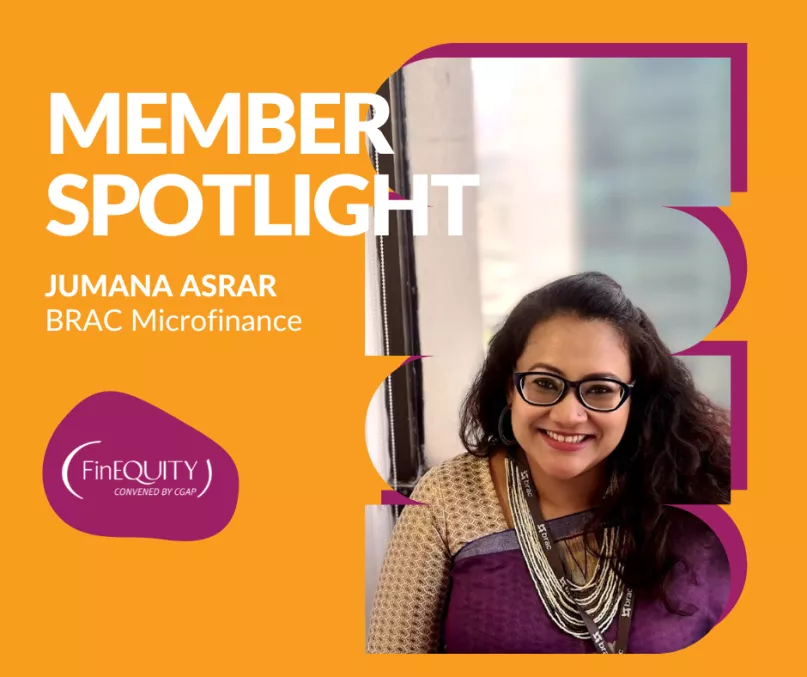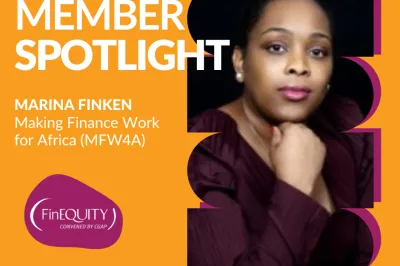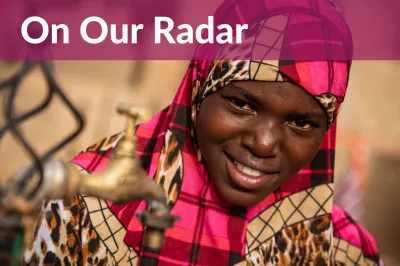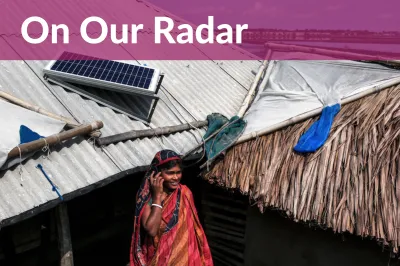Member Spotlight: Jumana Asrar

Jumana Asrar, Head of Research and Insight for BRAC Microfinance, sat down with us to discuss what originally drew her to research in the women's financial inclusion space, some of her most meaningful findings, and how those findings shed light on where the sector is headed.
FinEquity: Tell us a little bit about yourself. A fun fact? Something that might surprise most people? Your superpower?
Asrar: I am Jumana Asrar, I work as the Head of Research and Insights at BRAC's Microfinance Programme in Bangladesh. I have been working as a researcher in this market for more than 14 years across three different industries - pharmaceuticals, telecommunication, mobile financial services (MFS), and then finally in the development sector, which gave me an opportunity to explore how product/service selection priorities can change industry to industry at the end user or consumer level.
One fun fact about me is I can blend with people easily, and can adapt to any type of situation even though I am a bit of an introvert. This gives me strength to deal with any tricky situation that comes my way.
I would consider one of my superpowers to be that I am always extremely focused on “The Goal.” What I want to achieve from any project or goal, be it in my professional or my personal life, I believe that all the hurdles coming my way are a part of the process to make that goal successful. Listening without judging is another superpower of mine, and is why most people do not hesitate to open up to me — something that has worked to my advantage as a researcher.
Listening without judging is another superpower of mine, and is why most people do not hesitate to open up to me — something that has worked to my advantage as a researcher.
FinEquity: How did you get involved in the women’s financial inclusion space? And specifically, what drew you to research?
Asrar: After completing my education, I wanted to be a banker, being a researcher never crossed my mind. Back in 2007, very few organizations in Bangladesh had a dedicated role for consumer research. Interestingly, I eventually began working as a researcher because I love to travel and it provided a great opportunity to roam my country. Before I knew it, research became my passion! Listening to people from different walks of life, sharing their stories, opinions and aspirations made me realize how I can help in decoding the consumer’s voice to the supply side so they can be better served.
Through the years, I have seen how our country shifted from 2G to 4G, and how it impacted consumers' lifestyles. Back in 2010, women only used mobile phones to communicate with their near and dear ones but now, even in rural Bangladesh, women are using YouTube for entertainment and running businesses on Facebook. Despite these gains, there is always a fear of financial autonomy.
When I moved from the telecom sector and joined the leading MFS in Bangladesh, bKash, a mobile phone subsidiary of BRAC Bank, I was a bit shocked by the fact that women were not confident enough to use digital financial services (DFS) and often not willing to use a DFS wallet! Working in telco, I saw tons of young women in rural Bangladesh who were not using data, but were active in social media and their lifestyle was influenced by social media - I wondered why, then, weren't they willing to consider using DFS? With bKash, I was also able to connect with a wide range of unbanked people in Bangladesh, a segment where real change can happen just by converting their voices into insights. That experience was another turning point for me from consumer researcher to development practitioner.
Listening to people from different walks of life, sharing their stories, opinions, and aspirations made me realize how I can help in decoding the consumer’s voice to the supply side so they can be better served.
FinEquity: You’ve been the head of Research and Insight with BRAC for about a year, can you tell us a bit about what that experience has been like so far? What are you working on that makes you excited?
Asrar: Bringing a voice to unbanked populations has been a wonderful opportunity, and any researcher would be happy to work for the world’s #1 NGO. BRAC microfinance of Bangladesh has 6.5 million clients, 90% of which are women, and has been consistently working to positively impact quality of living for Bangladeshis over the last 50 years.
On a visit with a few of our clients, I was utterly amazed looking at their connection with BRAC. BRAC centers research in every phase of work, making it a learning-focused, client-centric organization. There are many stories about how BRAC Microfinance is creating differences in quality of life and resilience. BRAC's scale and integrated approach to development and financial inclusion set it apart from most other Microfinance Institutions (MFIs).
I joined BRAC during the peak of the pandemic in Bangladesh, and during that crisis period BRAC was the only MFI who refinanced and restructured loan tenures to help clients in recovery. Generating insights on how we are impacting their livelihood excites me most in this organization.
FinEquity: As a long-time researcher, what have been some of the most impactful findings you’ve come across in your career? What about in the last few years?
Asrar: Even within the same socio-economic class, clients’ confidence levels around products and services vary. When I was working in telco in 2016, I met a few rural young women who were smartphone owners and quite tech-savvy (they received the phones as gifts from family members who were remittance earners). After moving to the MFS sector, I visited a similar group of respondents and found they were also tech-savvy and using different apps, but were not confident enough to use a financial app. In most cases, they preferred assisted services from agents. Fear of losing money and lower financial literacy made their confidence shaky, and our DFS products and services at the time were not designed with women clients in mind, despite women comprising about 50% of the population.
During the pandemic, Bangladesh has seen a digital shift. Smartphone penetration went up, and DFS usage increased at the same time our client base suffered due to a drop in income. There remain immense opportunities to understand how our clients are recovering from the global pandemic.

FinEquity: How do those findings shed light on where the sector should be focusing?
Asrar: There is a huge gap in financial inclusion in terms of gender. Though 90% of our clients are female, very few utilize loans for their own income generating activities. One of the major reasons behind this is they themselves believe that finances should be maintained by a male member of the family. A specific group of young women do have smartphones in rural Bangladesh, but a substantial chunk of our women clients do not own phones, and women are falling behind in DFS usage.
FinEquity: What are your top priorities in 2022 for your work?
Asrar: This year, one of our top priorities is to design an impact framework where we dig deeper into our existing data to assess and measure the impact of our activities and how our clients are recovering after the shock of the pandemic. We are also working on a gender transformative project where we are trying to find the impact of our interventions, and providing to our female clients who are interested to be in IGA.
FinEquity: Do you have a success story from your work with BRAC you’d like to share? (An occasion where you felt that you or your organization was making a real impact in the lives of women?)
Asrar: During my field orientation at BRAC I met a female client in one of the rural districts of Rangpur who has been with BRAC for an exceptionally long time. She has never defaulted and has always participated in income generating activity along with her husband. She made a grocery store from a room with a window near the roadside, choosing that location so she could manage both household chaos and business at the same time. While talking with her I saw a rice cooker beside her, and was shocked (it is very unusual to find a rice cooker in the village where she lives). I asked her, "Why are you using a rice cooker?" and she said she was using it because it is difficult for her to manage customers while sitting beside a stove to cook rice (as sometime just for gap of few minutes rice turned into sticky rice which is usually not preferred in Bangladesh), and that she and her husband decided to use a rice cooker so they can fully focus on business. This type of upgrade in appliances for the sake of managing time is highly unusual for a rural household in Bangladesh.
FinEquity: What role does FinEquity play in your work? Where do you see value in this community? How has being a member shaped your work?
Asrar: We have 6.5 million clients, and as a major portion of them are women there will always be areas for collaboration and networking with others in the FinEquity community. This collaboration can lead to promising insights and ideas on how to keep innovating ways to increase financial literacy and confidence levels amongst the women we work with, and learning from industry peers who share their experiences and lessons learned.
One of our major priorities for the upcoming years is measuring impact, and, as part of this community, we'll have the chance to be part of the working group that is piecing together an Impact Pathways model to better measure women's financial inclusion.



It's true for a researchers listening without judge. The statement prove she had passion and love for this profession.
Leave a comment